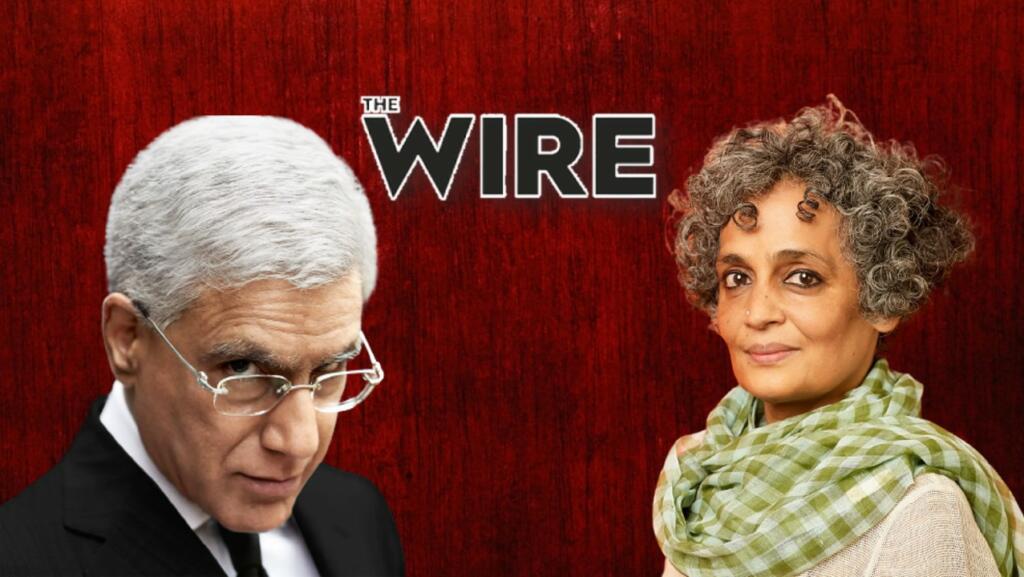Since 2014, the crisis within India’s liberal ecosystem has resulted in the marginalisation of far-left activists, while non-extremist liberals maintain a decaying hold over some sections of the national narrative. Therefore, while the voice of liberals is often heard on social and electronic media, the opinions of far-left pro-Balkanisation activists often end up on deaf ears. Far-left activists are either in jail for their support towards Naxals, or the ones that remain out satiate themselves by giving out time-killing interviews to propaganda portals like the Wire.
This is what has happened to Arundhati Roy, whose Booker Prize has only been able to take her to the Wire’s office for an hour-long interview with an irrelevant journalist – Karan Thapar. Both these individuals have a lot of idle time, and therefore, it makes sense for both to spend it talking to each other. So, with a serious look on his face, and a sense of conviction that India was being destroyed by the Modi government, Karan Thapar chose to ask the most difficult questions of Arundhati Roy.
In an alliterated line, Thapar asked, “Amidst the confusion, chaos and cacophony of Indian politics, what sort of country are we becoming?” Arundhati Roy, who predicted the Balkanisation of India during the interview, said Hindu nationalism could break India into little pieces, as has happened earlier with Yugoslavia and Russia.
Almost as if convincing herself that her fantasy will be stopped in its heels, Roy added that the Indian people will resist what she called Narendra Modi and the BJP’s fascism. Roy also copied the infamous “signs of Fascism” script from Google and read it out during the interview. Karan Thapar decisively agreed as the points were being read out. He was astonished.
Arundhati Roy had a lot of questions. She asked, “What have we done to democracy? What have we turned it into? What happens…when it has been hollowed out and emptied of meaning? What happens when each of its institutions has metastasised into something dangerous?”
Then, she went on to claim, “Over the last five years, India has distinguished itself as a lynching nation. Muslims and Dalits have been publicly flogged and beaten to death by vigilante Hindu mobs in broad-daylight, and the ‘lynch videos’ then gleefully uploaded to YouTube.”
Arundhati Roy, who is an open supporter of Kashmir’s secession from India, told Karan Thapar, “Why should they want to be a part of India? For what earthly reason? If freedom is what they want, freedom is what they should have.” According to Roy, India should be afraid of Kashmir, because according to her, “Kashmir may not defeat India, but it will consume India.”
Arundhati Roy also lamented how activists, lawyers, and academicians are supposedly languishing behind bars, while saffron-laden individuals like Yati Narsinghanand, who allegedly called for violence against Muslims, roam around freely on bail. She forgot to mention that while the participants of the controversial event at Haridwar are accused of calling for violence, far-left radicals currently in prison are actually there for orchestrating violence against the Indian state in cahoots with Naxals.
Roy compared the impact of Hindu nationalism in India with an attempt to squeeze an ocean into a ‘Bisleri bottle.’ She said, “The infrastructure of fascism is staring us in the face…and yet we hesitate to call it by its name.” Roy claimed that institutions like the judiciary, intelligence agencies, media and parliament have all become puppets in the hands of the Modi government. She made it a point to start the interview with a jibe at Gujaratis.
She said four Gujaratis are running India; two are selling it, while two are buying it. Arundhati’s mind has visibly begun decaying. From once being a famed author who was accustomed to setting the narrative against India, she has today become a person forced to do never-ending interviews with the likes of Karan Thapar – who himself has become much of an outcast within the media fraternity.
It is for this reason that Arundhati Roy began a rant with Thapar against the Modi government. Eventually, it became a forum for her to attack India and its culture itself, and Thapar was more than willing to indulge.
